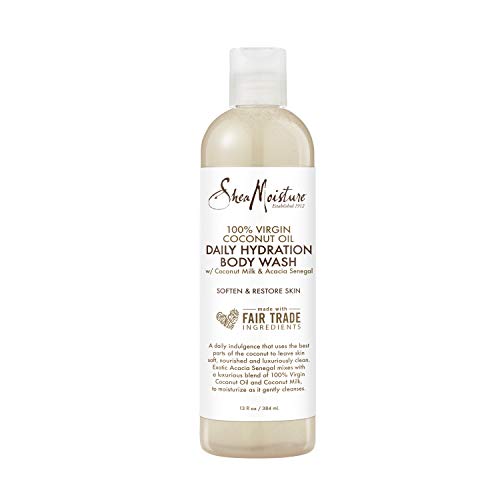
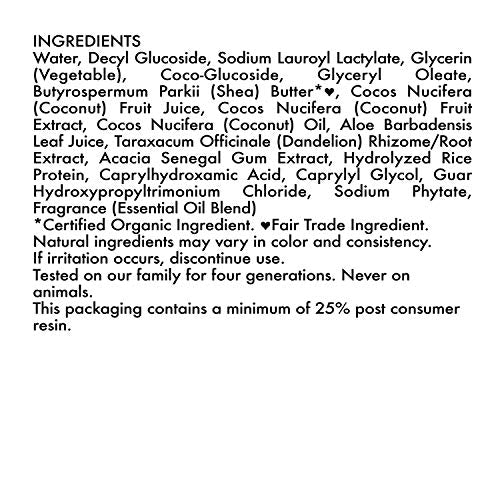
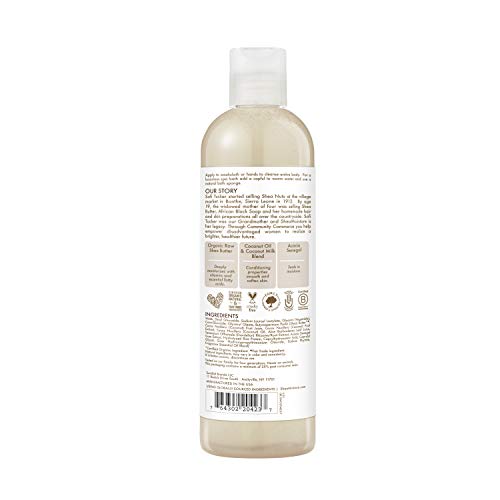
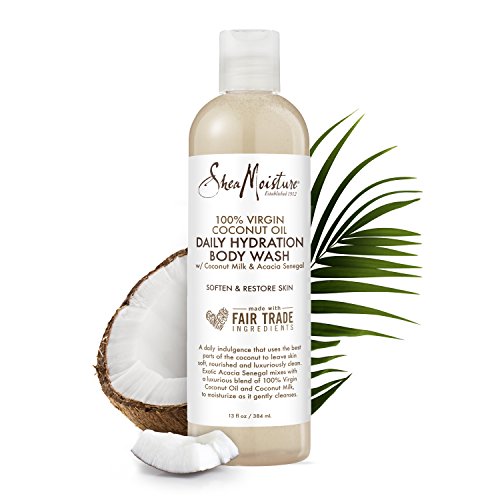
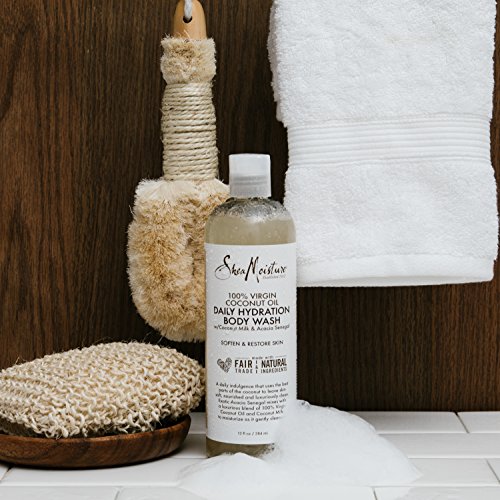
SheaMoisture Body Wash - Hydrating Coconut Oil & Shea Butter, Gentle Cleanser - 13oz


Fragrance
High RiskFragrance refers to a mixture of aromatic compounds used in products to provide scent. It is commonly listed as 'fragrance' or 'parfum' on product labels and can serve various functions, including enhancing user experience and masking undesirable odors.
Sustai Insights
Fragrance offers functional benefits by improving product appeal; however, it poses significant health risks, notably a high likelihood of causing allergies and allergic contact dermatitis. Environmental risks include potential pollution and endocrine disruption, though its overall carcinogenicity is low. Regulatory bodies have noted concerns regarding its use, leading to a high-risk classification. Safe usage practices should be observed, and alternatives such as natural essential oils are recommended for those sensitive to synthetic fragrances.
Caprylyl Glycol
Low RiskCaprylyl glycol (1,2-octanediol) is a multifunctional cosmetic ingredient primarily used as a skin-conditioning agent and preservative. It is derived from caprylic acid, a fatty acid found in coconut oil, and is commonly included in personal care products for its moisturizing properties.
Sustai Insights
Caprylyl glycol offers functional benefits such as acting as an effective humectant and preservative, enhancing skin hydration and product stability. It is considered to have low health risks, with no significant concerns regarding carcinogenicity, allergies, or reproductive toxicity. Environmentally, it poses minimal risks, being non-bioaccumulative and not linked to pollution. Regulatory assessments affirm its safety, with no major advisories against its use. Overall, the ingredient is assessed to have a low risk, making it a suitable choice in cosmetic formulations.
Hydrolyzed Rice Protein
Low RiskHydrolyzed rice protein is a hydrolysate of rice protein, commonly used in cosmetic and personal care products for its film-forming and moisturizing properties. It serves as a conditioning agent that can enhance the texture and feel of formulations.
Sustai Insights
Hydrolyzed rice protein offers functional benefits such as improving moisture retention and hair manageability. It is derived from renewable sources and is biodegradable. Health risks are generally low, with minimal concerns regarding carcinogenicity, allergies, or reproductive toxicity. However, contamination concerns are noted. Environmental risks appear low, with no significant pollutant or bioaccumulative properties. Regulatory status indicates no major restrictions. Overall, the risk level is assessed as low, making it a viable ingredient in formulations with appropriate usage practices.
Sodium Lauroyl Lactylate
Low RiskSodium lauroyl lactylate is a sodium salt of lauric acid and lactyl lactate, primarily used in cosmetic formulations as an emulsifier and skin conditioning agent. It helps to enhance the texture and stability of products while also promoting skin feel.
Sustai Insights
Sodium lauroyl lactylate is valued for its emulsifying properties, improving product texture and stability. It is considered biodegradable and sustainably sourced, contributing to eco-friendliness. Health risks are low, with minimal concerns regarding carcinogenicity, allergenic potential, and reproductive toxicity. Environmental risks are also low, with no significant bioaccumulation or pollution potential identified. Regulatory bodies have not imposed restrictions on its use. Overall, this ingredient presents a low risk profile, making it a suitable choice for cosmetic formulations.
Glyceryl Oleate
Low RiskGlyceryl oleate is composed of glycerin and oleic acid, functioning primarily as an emulsifier and surfactant in cosmetic and personal care products. It helps to stabilize formulations by blending water and oils while also offering moisturizing properties.
Sustai Insights
Glyceryl oleate is effective in emulsifying and moisturizing, contributing positively to product texture. It is considered low risk for health concerns such as carcinogenicity, allergies, and developmental toxicity, although moderate irritation potential exists. Environmentally, it does not significantly contribute to pollution or bioaccumulation. Regulatory bodies have not issued restrictions, affirming its safety for use. Overall, it is regarded as a low-risk ingredient, with no immediate health or environmental hazards noted, making it a suitable choice in formulations.
Sodium Phytate
Low RiskSodium phytate is a complex sodium salt of phytic acid, primarily used in cosmetic formulations as a chelating agent. It helps to stabilize formulations by binding metal ions, which can improve product efficacy and shelf life.
Sustai Insights
Sodium phytate offers functional benefits by enhancing product stability and is considered to have low health risks, with no significant associations with carcinogenicity, allergies, or reproductive toxicity. Environmentally, it poses minimal risks, as it is not considered a pollutant or bioaccumulative. Regulatory status indicates no significant restrictions. Overall, the ingredient is assessed as low risk. However, users should practice safe usage and consider alternatives like other chelating agents if desired.
Cocos Nucifera (Coconut) Fruit Juice
Low RiskCocos Nucifera (Coconut) Fruit Juice is a liquid derived from the fruit of the coconut palm, widely used in cosmetic formulations for its moisturizing and soothing properties. It serves as a natural humectant, helping to maintain skin hydration and improve texture in various personal care products.
Sustai Insights
Cocos Nucifera (Coconut) Fruit Juice offers functional benefits such as hydration and skin soothing, making it a beneficial ingredient in cosmetics. It is sustainably sourced and biodegradable, contributing positively to environmental considerations. Health risks are low, with no significant concerns regarding carcinogenicity, allergens, or reproductive toxicity. Regulatory bodies impose few restrictions, and overall risk is assessed as low. Safe usage promotes skin health without notable adverse effects. Alternatives include other fruit juices or plant extracts that offer similar moisturizing properties.
Cocos Nucifera (Coconut) Oil
Low RiskCocos Nucifera (Coconut) Oil is derived from the kernels of the coconut palm. It is primarily used in cosmetic formulations for its emollient and moisturizing properties, making it suitable for skin and hair care products.
Sustai Insights
Coconut oil serves as an effective moisturizer and emollient, promoting skin hydration and softness. It is sustainably sourced and biodegradable. Health risks are minimal, with low concerns regarding carcinogenicity, allergens, and reproductive toxicity. Environmental impact is also low, as it does not contribute significantly to pollution or bioaccumulation. Regulatory bodies have not issued restrictions on its use. Overall, coconut oil presents a low risk for health and environmental concerns, making it a safe ingredient in cosmetic products.
Water
Low RiskWater is a clear, colorless liquid essential for various biological processes. It serves as a solvent in formulations, facilitating the dissolution of other ingredients and enhancing product texture and application. Additionally, water plays a crucial role in hydration and is a key component in many cosmetic and personal care products.
Sustai Insights
Water is an effective solvent and hydrator, contributing to the texture and efficacy of formulations. It is biodegradable and generally regarded as safe, with low concerns regarding carcinogenicity, allergies, and reproductive toxicity. However, excessive water usage can lead to environmental concerns, particularly regarding resource depletion. Regulatory bodies do not impose restrictions on water use in cosmetics. Overall, the risks associated with water are low, making it a safe and essential ingredient.
Butyrospermum Parkii (Shea) Butter
Low RiskButyrospermum parkii (shea) butter is a vegetable fat derived from the nuts of the shea tree. It is commonly used in cosmetic formulations for its emollient properties, providing moisture and improving skin texture. Additionally, shea butter is known for its ability to enhance the stability of products and deliver a creamy texture.
Sustai Insights
Shea butter offers functional benefits as an effective moisturizer, enhancing skin barrier function and texture. It is sustainably sourced and biodegradable, contributing to eco-friendliness. Health-wise, it is associated with low risks for carcinogenicity, allergies, and reproductive toxicity. Environmental impacts are minimal, with no significant pollutant potential identified. Regulatory assessments indicate no current restrictions. Overall, the ingredient presents a low risk, making it a favorable choice in cosmetic formulations.
Guar Hydroxypropyltrimonium Chloride
Low RiskGuar hydroxypropyltrimonium chloride is a quaternary ammonium compound derived from guar gum, primarily used as a conditioning agent in cosmetic products. It enhances the texture and feel of hair and skin formulations, providing moisture retention and improved manageability.
Sustai Insights
This ingredient offers functional benefits as a conditioning agent, improving the texture and moisture retention in formulations. It is considered low risk regarding health effects, with minimal concerns for carcinogenicity, allergies, or reproductive toxicity. Environmental risks are also low, as it does not accumulate significantly in ecosystems. Regulatory bodies have not imposed significant restrictions. Safe usage practices should be followed, but overall, this ingredient is assessed as low risk, with no immediate concerns regarding alternatives.
Decyl Glucoside
Low RiskDecyl glucoside is a glucose-based surfactant derived from natural sources, primarily used as a mild cleansing agent in personal care products. It effectively reduces surface tension, allowing for improved mixing of ingredients and enhanced cleansing properties without stripping natural oils from the skin.
Sustai Insights
Decyl glucoside offers functional benefits as a non-ionic surfactant, making it suitable for sensitive skin formulations. It is biodegradable and derived from renewable resources, supporting sustainability. Health risks are primarily low, with minimal concerns regarding irritation and allergies. Environmental risks are low, as it does not significantly contribute to pollution or bioaccumulation. Regulatory status is generally favorable, with low restrictions noted. Overall, decyl glucoside presents a low risk for use in consumer products, making it a suitable choice for gentle formulations.
Acacia Senegal Gum Extract
Low RiskAcacia senegal gum extract is an extract derived from the gum of the Acacia senegal tree, commonly used in cosmetics for its thickening and emulsifying properties. It serves to stabilize formulations and improve texture without imparting strong scents or colors.
Sustai Insights
Acacia senegal gum extract offers functional benefits as an effective emulsifier and stabilizer in cosmetic formulations, supporting product texture and stability. It is considered low risk for health concerns such as carcinogenicity, allergies, and developmental toxicity, with no significant environmental hazards reported. Regulatory status indicates no widespread restrictions. Overall, it presents a low risk profile, making it a favorable choice in cosmetic applications.
Caprylyl Glycol
Low RiskCaprylyl glycol (1,2-octanediol) is a multifunctional cosmetic ingredient primarily used as a skin-conditioning agent and preservative. It is derived from caprylic acid, a fatty acid found in coconut oil, and is commonly included in personal care products for its moisturizing properties.
Sustai Insights
Caprylyl glycol offers functional benefits such as acting as an effective humectant and preservative, enhancing skin hydration and product stability. It is considered to have low health risks, with no significant concerns regarding carcinogenicity, allergies, or reproductive toxicity. Environmentally, it poses minimal risks, being non-bioaccumulative and not linked to pollution. Regulatory assessments affirm its safety, with no major advisories against its use. Overall, the ingredient is assessed to have a low risk, making it a suitable choice in cosmetic formulations.
Hydrolyzed Rice Protein
Low RiskHydrolyzed rice protein is a hydrolysate of rice protein, commonly used in cosmetic and personal care products for its film-forming and moisturizing properties. It serves as a conditioning agent that can enhance the texture and feel of formulations.
Sustai Insights
Hydrolyzed rice protein offers functional benefits such as improving moisture retention and hair manageability. It is derived from renewable sources and is biodegradable. Health risks are generally low, with minimal concerns regarding carcinogenicity, allergies, or reproductive toxicity. However, contamination concerns are noted. Environmental risks appear low, with no significant pollutant or bioaccumulative properties. Regulatory status indicates no major restrictions. Overall, the risk level is assessed as low, making it a viable ingredient in formulations with appropriate usage practices.
Sodium Lauroyl Lactylate
Low RiskSodium lauroyl lactylate is a sodium salt of lauric acid and lactyl lactate, primarily used in cosmetic formulations as an emulsifier and skin conditioning agent. It helps to enhance the texture and stability of products while also promoting skin feel.
Sustai Insights
Sodium lauroyl lactylate is valued for its emulsifying properties, improving product texture and stability. It is considered biodegradable and sustainably sourced, contributing to eco-friendliness. Health risks are low, with minimal concerns regarding carcinogenicity, allergenic potential, and reproductive toxicity. Environmental risks are also low, with no significant bioaccumulation or pollution potential identified. Regulatory bodies have not imposed restrictions on its use. Overall, this ingredient presents a low risk profile, making it a suitable choice for cosmetic formulations.
Glyceryl Oleate
Low RiskGlyceryl oleate is composed of glycerin and oleic acid, functioning primarily as an emulsifier and surfactant in cosmetic and personal care products. It helps to stabilize formulations by blending water and oils while also offering moisturizing properties.
Sustai Insights
Glyceryl oleate is effective in emulsifying and moisturizing, contributing positively to product texture. It is considered low risk for health concerns such as carcinogenicity, allergies, and developmental toxicity, although moderate irritation potential exists. Environmentally, it does not significantly contribute to pollution or bioaccumulation. Regulatory bodies have not issued restrictions, affirming its safety for use. Overall, it is regarded as a low-risk ingredient, with no immediate health or environmental hazards noted, making it a suitable choice in formulations.
Sodium Phytate
Low RiskSodium phytate is a complex sodium salt of phytic acid, primarily used in cosmetic formulations as a chelating agent. It helps to stabilize formulations by binding metal ions, which can improve product efficacy and shelf life.
Sustai Insights
Sodium phytate offers functional benefits by enhancing product stability and is considered to have low health risks, with no significant associations with carcinogenicity, allergies, or reproductive toxicity. Environmentally, it poses minimal risks, as it is not considered a pollutant or bioaccumulative. Regulatory status indicates no significant restrictions. Overall, the ingredient is assessed as low risk. However, users should practice safe usage and consider alternatives like other chelating agents if desired.
Fragrance
High RiskFragrance refers to a mixture of aromatic compounds used in products to provide scent. It is commonly listed as 'fragrance' or 'parfum' on product labels and can serve various functions, including enhancing user experience and masking undesirable odors.
Sustai Insights
Fragrance offers functional benefits by improving product appeal; however, it poses significant health risks, notably a high likelihood of causing allergies and allergic contact dermatitis. Environmental risks include potential pollution and endocrine disruption, though its overall carcinogenicity is low. Regulatory bodies have noted concerns regarding its use, leading to a high-risk classification. Safe usage practices should be observed, and alternatives such as natural essential oils are recommended for those sensitive to synthetic fragrances.
Cocos Nucifera (Coconut) Fruit Juice
Low RiskCocos Nucifera (Coconut) Fruit Juice is a liquid derived from the fruit of the coconut palm, widely used in cosmetic formulations for its moisturizing and soothing properties. It serves as a natural humectant, helping to maintain skin hydration and improve texture in various personal care products.
Sustai Insights
Cocos Nucifera (Coconut) Fruit Juice offers functional benefits such as hydration and skin soothing, making it a beneficial ingredient in cosmetics. It is sustainably sourced and biodegradable, contributing positively to environmental considerations. Health risks are low, with no significant concerns regarding carcinogenicity, allergens, or reproductive toxicity. Regulatory bodies impose few restrictions, and overall risk is assessed as low. Safe usage promotes skin health without notable adverse effects. Alternatives include other fruit juices or plant extracts that offer similar moisturizing properties.
Cocos Nucifera (Coconut) Oil
Low RiskCocos Nucifera (Coconut) Oil is derived from the kernels of the coconut palm. It is primarily used in cosmetic formulations for its emollient and moisturizing properties, making it suitable for skin and hair care products.
Sustai Insights
Coconut oil serves as an effective moisturizer and emollient, promoting skin hydration and softness. It is sustainably sourced and biodegradable. Health risks are minimal, with low concerns regarding carcinogenicity, allergens, and reproductive toxicity. Environmental impact is also low, as it does not contribute significantly to pollution or bioaccumulation. Regulatory bodies have not issued restrictions on its use. Overall, coconut oil presents a low risk for health and environmental concerns, making it a safe ingredient in cosmetic products.
Water
Low RiskWater is a clear, colorless liquid essential for various biological processes. It serves as a solvent in formulations, facilitating the dissolution of other ingredients and enhancing product texture and application. Additionally, water plays a crucial role in hydration and is a key component in many cosmetic and personal care products.
Sustai Insights
Water is an effective solvent and hydrator, contributing to the texture and efficacy of formulations. It is biodegradable and generally regarded as safe, with low concerns regarding carcinogenicity, allergies, and reproductive toxicity. However, excessive water usage can lead to environmental concerns, particularly regarding resource depletion. Regulatory bodies do not impose restrictions on water use in cosmetics. Overall, the risks associated with water are low, making it a safe and essential ingredient.
Butyrospermum Parkii (Shea) Butter
Low RiskButyrospermum parkii (shea) butter is a vegetable fat derived from the nuts of the shea tree. It is commonly used in cosmetic formulations for its emollient properties, providing moisture and improving skin texture. Additionally, shea butter is known for its ability to enhance the stability of products and deliver a creamy texture.
Sustai Insights
Shea butter offers functional benefits as an effective moisturizer, enhancing skin barrier function and texture. It is sustainably sourced and biodegradable, contributing to eco-friendliness. Health-wise, it is associated with low risks for carcinogenicity, allergies, and reproductive toxicity. Environmental impacts are minimal, with no significant pollutant potential identified. Regulatory assessments indicate no current restrictions. Overall, the ingredient presents a low risk, making it a favorable choice in cosmetic formulations.
Guar Hydroxypropyltrimonium Chloride
Low RiskGuar hydroxypropyltrimonium chloride is a quaternary ammonium compound derived from guar gum, primarily used as a conditioning agent in cosmetic products. It enhances the texture and feel of hair and skin formulations, providing moisture retention and improved manageability.
Sustai Insights
This ingredient offers functional benefits as a conditioning agent, improving the texture and moisture retention in formulations. It is considered low risk regarding health effects, with minimal concerns for carcinogenicity, allergies, or reproductive toxicity. Environmental risks are also low, as it does not accumulate significantly in ecosystems. Regulatory bodies have not imposed significant restrictions. Safe usage practices should be followed, but overall, this ingredient is assessed as low risk, with no immediate concerns regarding alternatives.
Decyl Glucoside
Low RiskDecyl glucoside is a glucose-based surfactant derived from natural sources, primarily used as a mild cleansing agent in personal care products. It effectively reduces surface tension, allowing for improved mixing of ingredients and enhanced cleansing properties without stripping natural oils from the skin.
Sustai Insights
Decyl glucoside offers functional benefits as a non-ionic surfactant, making it suitable for sensitive skin formulations. It is biodegradable and derived from renewable resources, supporting sustainability. Health risks are primarily low, with minimal concerns regarding irritation and allergies. Environmental risks are low, as it does not significantly contribute to pollution or bioaccumulation. Regulatory status is generally favorable, with low restrictions noted. Overall, decyl glucoside presents a low risk for use in consumer products, making it a suitable choice for gentle formulations.
Acacia Senegal Gum Extract
Low RiskAcacia senegal gum extract is an extract derived from the gum of the Acacia senegal tree, commonly used in cosmetics for its thickening and emulsifying properties. It serves to stabilize formulations and improve texture without imparting strong scents or colors.
Sustai Insights
Acacia senegal gum extract offers functional benefits as an effective emulsifier and stabilizer in cosmetic formulations, supporting product texture and stability. It is considered low risk for health concerns such as carcinogenicity, allergies, and developmental toxicity, with no significant environmental hazards reported. Regulatory status indicates no widespread restrictions. Overall, it presents a low risk profile, making it a favorable choice in cosmetic applications.
Experience the luxurious nourishment of SheaMoisture 100% Virgin Coconut Oil Daily Hydration Bubble Bath & Body Wash. This 13-fluid ounce body wash gently cleanses while providing rich hydration, perfect for those seeking a sustainable and health-conscious bathing solution.
- Deep Moisture: Infused with Organic Raw Shea Butter, this wash delivers essential vitamins and fatty acids, restoring and softening your skin for a radiant glow.
- Hydrating Blend: The unique combination of Coconut Oil and Coconut Milk conditions your skin, enhancing its natural moisture barrier while leaving it feeling silky smooth.
- Gentle Cleanse: Formulated with no sulfates, parabens, or phthalates, it cleans without harsh chemicals, making it ideal for sensitive skin.
- Versatile Use: Use it as a daily body wash or indulge in a spa-like experience by adding it to your bath for a relaxing soak.
- Ethical Sourcing: Made with Fair Trade Shea Butter, supporting sustainable practices while delivering high-quality skincare that you can feel good about using.
Subscribe & Save with Sustai
- Best Price Guarantee: Always enjoy the lowest prices on sustainable home essentials.
- No Surprises: We’ll notify you before shipping. No hidden fees, ever.
- You’re in Charge: Change, pause, or cancel your subscription anytime with ease.
- Eco-Friendly Deliveries: Our grouped shipments mean less packaging and lower emissions.
Join us on a sustainable journey. Special offers for a limited time! Prices and promotions may change.
Recommended Products
Experience the luxurious nourishment of SheaMoisture 100% Virgin Coconut Oil Daily Hydration Bubble Bath & Body Wash. This 13-fluid ounce body wash gently cleanses while providing rich hydration, perfect for those seeking a sustainable and health-conscious bathing solution.
- Deep Moisture: Infused with Organic Raw Shea Butter, this wash delivers essential vitamins and fatty acids, restoring and softening your skin for a radiant glow.
- Hydrating Blend: The unique combination of Coconut Oil and Coconut Milk conditions your skin, enhancing its natural moisture barrier while leaving it feeling silky smooth.
- Gentle Cleanse: Formulated with no sulfates, parabens, or phthalates, it cleans without harsh chemicals, making it ideal for sensitive skin.
- Versatile Use: Use it as a daily body wash or indulge in a spa-like experience by adding it to your bath for a relaxing soak.
- Ethical Sourcing: Made with Fair Trade Shea Butter, supporting sustainable practices while delivering high-quality skincare that you can feel good about using.

You can have at most 2 Sustainable Steals products in your cart
Customer Reviews
Customers’ View
Customers appreciate the moisturizing properties and gentle cleansing ability of SheaMoisture's Bubble Bath and Body Wash. Many highlight that it leaves their skin feeling soft, hydrated, and clean, with a pleasant and calming scent reminiscent of shea butter. Users value the clean formula, noting that it is free from sulfates and parabens, making it suitable for sensitive skin types. Additionally, the product's ethical sourcing, particularly the use of Fair Trade Shea Butter, resonates with environmentally conscious consumers. While some customers express mixed feelings about its consistency and value for money, the majority find it effective and aligned with their sustainable lifestyle choices. Overall, this body wash is recognized for enhancing the bathing experience while prioritizing skin health and environmental responsibility.
AI-generated from the text of customer reviewsThis product is rated 4.7 of 5.0 stars.
It has received 23 reviews.




